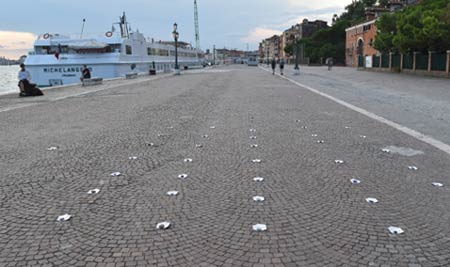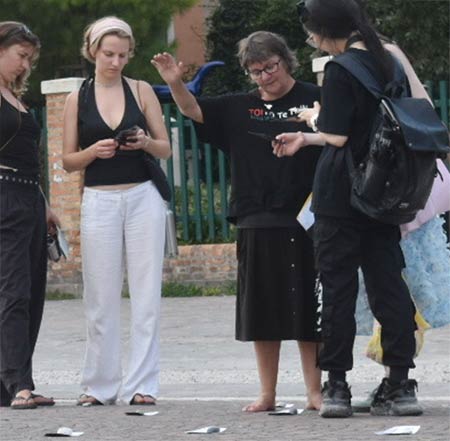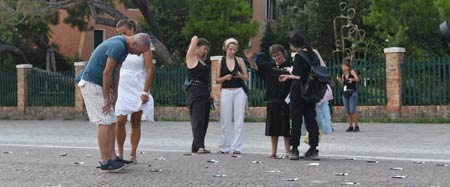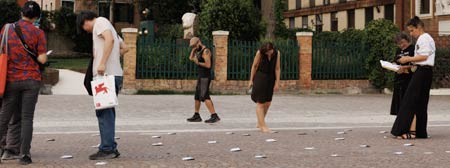



About our performance
House of the LivingWhakatauākī / WhakataukīIf author is known / if the author is unknown | City or town, country, optional link to that person |
Kotahi te kōhao o te ngira e kuhuna ai te miro ma, te miro pango, te miro whero. (Pōtatau Te Wherowhero, 1858) United, through the eye of the needle pass the white thread, the black thread, and the red thread. (Te Wherowhero was the 1st Māori king) | City or town, country |
Ehara tēnei i te maunga nekeneke, he maunga tū tonu a Hikurangi. This mountain does not move, Hikurangi is a mountain that stands still | City or town, country |
Tīramarama te marama whitiwhiti hei mata
i te rangi o te pō. The moon shines as an eye for the night's sky | City or town, country |
Ake Tonu, Ka Rere Ai (George Parekōwhai, 2020) Forever and ever, to fly! (Ideas fly out and always will) | City or town, country |
Te Pūkoro o Tāne. (George Parekōwhai, 2020) Tāne's top pocket (refers to Tāne's baskets of knowledge) | City or town, country |
Mā te rongo ka kite. (Heeni Tane, 2023) With the senses/perception we can see. (rongo also refers to peace and the environment) | City or town, country |
Te Hinengaro whakawātea. (Heeni Tane, 2023) The unbounded, untamed, released, mind / spirit | City or town, country |
He whakaahua, he mea matarau. (Sonja van Kerkhoff, 2023) Art, that 100 faced thing. | City or town, country |
He kokonga whare e kitea, he kokonga ngākau e kore e kitea. Corners of a house can be seen, not so with the corners of a heart. | City or town, country |
Ahakoa he iti, he pounamu. Although it is small, it is greenstone. | City or town, country |
Nāu te rourou, nāku te rourou, ka ora ai te iwi. With your food basket, with my food basket the tribe will thrive. | City or town, country |
Mā whero, mā pango ka oti ai te mahi. With red (low-born) and black (high-born) the work will be complete. | City or town, country |
Ehara taku toa i te toa takitahi, engari kē he toa takitini. My courage was not the courage of one but the courage of many. | City or town, country |
He rau ringa e oti ai. A hundred hands, and it's done. | City or town, country |
Toitū te whenua, whatungarongaro te tangata. The land remains, people pass on. | City or town, country |
He iti te mokoroa, nāna i kati te kahikatea. The tiny pūriri moth caterpillar bites (cuts through) the giant kahikatea tree. | City or town, country |
He kai kei aku ringa. Food is at my hands. | City or town, country |
Kia mate ururoa, kei mate wheke. Die (fight) like a white shark, not like an octopus. | City or town, country |
Ngaro atu he tētēkura, whakaeke mai he tētēkura. When one carved figurehead (chief) disappears, another appears. | City or town, country |
He kōtuku rerenga tahi. The white heron of a single flight. (a rare visitor) | City or town, country |
Ka pū te ruha, ka hao te rangatahi. The worn-out fishing net lies in a heap, the (new) 20 metre fishing net catches fish. | City or town, country |
Tama tū, tama ora; tama noho, tama mate kai. He who stands lives well, he who sits, is hungry. | City or town, country |
Te anga karaka, te anga koura, kei kitea te Marae. The karaka berry shells and the crayfish husks, should not be visible on the Marae. (clean up and look after the common grounds) | City or town, country |
He wāhine, he whenua, ka ngaro te tangata. Women, the land, men perish, go missing | City or town, country |
He aha te kai ō te rangatira? He Kōrero, he kōrero, he kōrero. What is food for the chief? Words, communication. | City or town, country |
Kāore te kūmara e kōrero mō tōna ake reka The kumara (sweet potato) does speak of its own sweetness | City or town, country |
E kore te pātiki e hoki ki tōna puehu. The flounder does not return to what it has stirred up. | City or town, country |
He manako te kōura i kore ai. When salt-water crayfish are expected, then there are none. | City or town, country |
E koekoe te tūī, e ketekete te kākū, e kūkū te kererū. The tūī sings, the kākā chatters, the pigeon coos. (each has their own voice) | City or town, country |
He aha te mea nui o te ao? He tāngata, he tāngata, he tāngata. What is the most important thing in the world? People, people, people. | City or town, country |
Whāia te iti kahurangi ki te tūohu koe me he maunga teitei. Seek the treasure you value, if you bow your head, let it be to a lofty mountain. | City or town, country |
He waka eke noa. (we are all) on the same canoe. | City or town, country |
He tangata takahi manuhiri, he marae puehu. A person who mistreats a guest has a dusty marae (community house / home). | City or town, country |
Tangata ako ana i te kāenga, te tūranga ki te marae, tau ana. One who is taught at home, stands well on the marae (in the community). | City or town, country |
He tao rākau e taea te karo, he tao kī e kore e taea te karo. A spear of wood can be overcome, not so (easily) a spear of words. | City or town, country |
He kākano i ruia mai i Rangiātea. A seed scattered from Rangiātea (signifies nobility) | City or town, country |
Ko te amorangi ki mua, ko te hāpai ō ki muri. The leader at the front, workers behind the scenes. | City or town, country |
He aroha whakatō, he aroha puta mai. Love sown, love comes forth. | City or town, country |
He wā pekepeke, he wā tārewa. A time for jumping, a time to hang (not make a decision) | City or town, country |
He hāngai pū kōrero, e kore e tau mai te patu. Words of wisdom can never be refuted. | City or town, country |
Tōtara wāhi rua, he kai na te ahi. Split tōtara (wood) is food for the fire. | City or town, country |
Kua hinga te tōtara i te wao nui a Tāne. The totara has fallen in the forest of Tane (when someone of importance has died). | City or town, country |